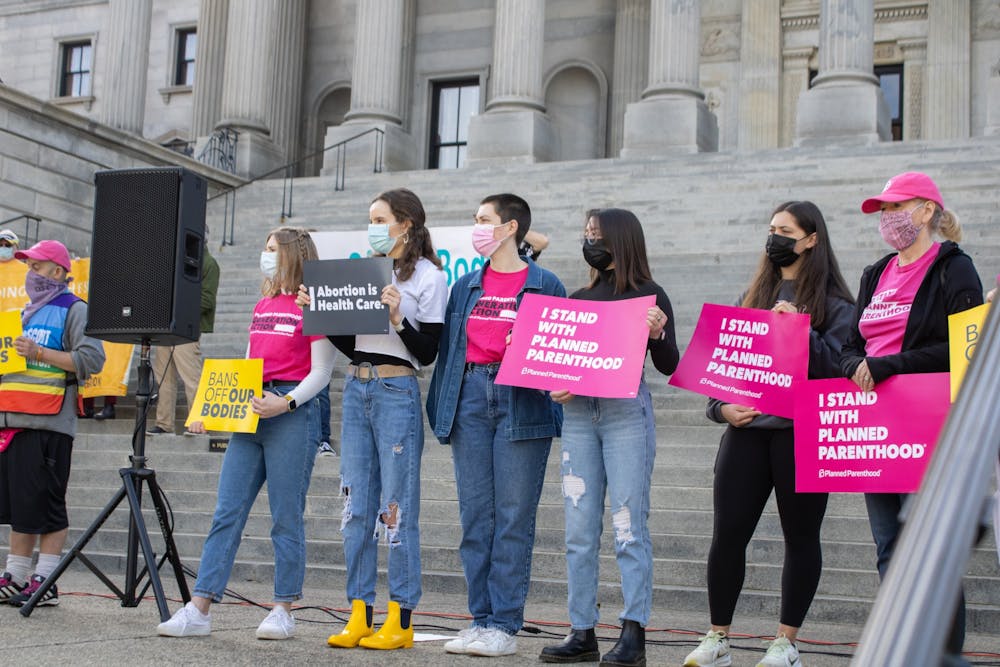Students and activists gathered outside of the South Carolina Statehouse on Feb. 17 to protest two bills moving through the S.C. Senate, including one which could impose a total ban on abortions.
Planned Parenthood South Atlantic and the Women’s Rights and Empowerment Network (WREN) collaborated to organize the rally, joined by guest speakers from various groups, including the Soda City Bail Fund and Pro-Choice With Hearts.
The first bill, designated S.988, also referred to as the “Equal Protection for Unborn Babies Act,” was first introduced and read in the Senate on Jan. 13. It was then referred to the Senate Committee on Medical Affairs.
According to the bill, S.988 would ban abortions in South Carolina. This would occur only if Roe v. Wade gets overturned at a federal level, according to Bill S.988.
According to The New York Times, the U.S. Supreme Court is scheduled to hear a case regarding a Mississippi law that seeks to ban abortions after 15 weeks of pregnancy. The Times said that, due to a recent conservative majority, the Supreme Court is likely to utilize the Mississippi case to overturn Roe v. Wade by the end of this year.
According to the conditions of the bill, exceptions include treatment of ectopic pregnancies, removal of unborn babies caused by a spontaneous abortion (miscarriage) and procedures intended to save the life of the unborn baby.
The South Carolina State Senate currently has five female senators. During Thursday's rally, Sen. Margie Bright Matthews and Sen. Mia McLeod — two female Democratic senators in the S.C. Senate — called on the other women of the Senate to take further action.
“It's personal for every woman and every girl in the state. These are decisions to be made by us. Not for us,” McLeod said.
Matthews said she expects that, if the Supreme Court were to overturn Roe v. Wade, the South Carolina Senate would vote in favor of Bill S.988.
“We don’t have the numbers because South Carolina has not shown up the way it should for us,” Matthews said in reference to the Senate's Democratic minority who oppose the two bills.
With the passage of S.988, those convicted of performing or inducing an abortion could be punished in the same manner as those convicted of murder, including facing prison time or the death penalty, according to S.988 and section 16-3-20 of South Carolina state law.
Critics of Bill S.988 also raised concerns about the additional disadvantages the bill could pose to those with financial limitations. Kim Smith, Co-Founder of the Soda City Bail Fund, said S.988 would force people of color in low-wage jobs to seek abortions out-of-state, which often falls outside their financial capabilities.
“It is a blatant attempt to further marginalize the poor and dispossessed of South Carolina,” Smith said.
The counterpart to S.988, Senate Bill S.907, was introduced and read in the Senate on Dec. 6, 2021. Bill S.907 also currently resides in the Senate Committee on Medical Affairs.
If passed, S.907 would require physicians to provide a disclosure statement to abortion patients after administering the abortion-inducing drug mifepristone. The disclosure statement outlines an option for women who wish to reverse the procedure, offering the administration of progesterone as a resource to “potentially strengthen the pregnancy" according to Bill S.907.
Columbia-based obstetrician-gynecologist Dr. Katie Wyatt expressed her concerns regarding the recommendation of progesterone in S.907.
“The only medical data on this had to be stopped due to life-threatening bleeding,” Wyatt said.
The rally concluded with a collection of speakers who shared the personal experiences that influenced their decision to protest. According to the South Carolina State Legislature meeting schedule, bills S.907 and S.988 were expected to be brought to the Senate floor on Feb. 17.

